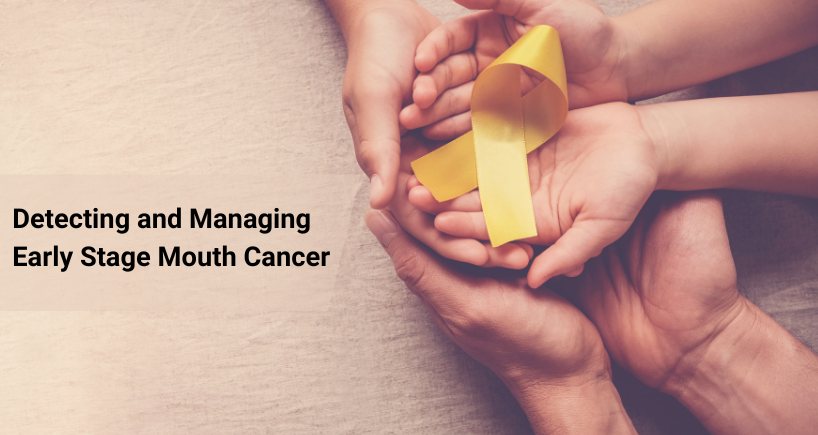
Detecting and Managing Early Stage Mouth Cancer
Oral cancer is a condition that can affect various parts of the mouth, including the cheeks. Detecting oral cancer in its early stages is crucial for successful treatment and improved outcomes. In this article, we will delve into the topic of early stage mouth cancer, its signs, risk factors, diagnostic methods, and treatment options.
Understanding Early Stage Mouth Cancer
Oral cancer can arise from cheeks also known as buccal mucosa, tongue, lip floor of mouth and palate. Cheek cancer starts in the thin, flat cells lining the inner cheeks (Buccal mucosa) and similarly from other areas of mouth Oral cancer can be aggressive and have serious consequences if not detected and treated promptly.
Signs and Symptoms
Recognizing the signs of early stage mouth cancer is vital for early intervention. Common symptoms may include:
- Persistent red or white patches on the inner cheek lining
- Unexplained bleeding or numbness in the mouth
- A sore or ulcer that doesn't heal within a few weeks
- Difficulty or pain while chewing or swallowing
- A lump or thickening in the cheek or neck
- Difficulty in speech or swallowing
- Pain in the ear.
Risk Factors
- Several factors can increase the chance of developing oral cancers including cheek cancer:
- Tobacco and alcohol use: tobacco chewing, smoking and heavy alcohol consumption are major risk factors for oral cancer, including cheek cancer.
- Betel quid (Khaini): Chewing betel quid, a combination of areca nut, betel leaf, and slaked lime, is common in some cultures and increases the risk of oral cancer.
- Human papillomavirus (HPV): Certain strains of HPV are linked to an increased risk of oral cancer.
- Poor oral hygiene: Neglecting oral hygiene can contribute to the development of oral cancers.
- Sun exposure: Prolonged sun exposure to the lips increases the risk of lip cancer, which can sometimes extend to the buccal mucosa.
- Repeated irritation or injury due to excessive use of spices and sharp teeth can also lead to oral cancer
Diagnosis
Early detection of oral cancer including that of cheek relies on regular check-ups and self-examination. An oral or cancer surgeon may perform the following diagnostic procedures:
- Visual examination: A thorough examination of the mouth, cheeks, tongue, and throat.
- Biopsy: A small tissue sample is taken from the suspicious area for laboratory analysis.
- Imaging tests: X-rays, CT scans, and MRI scans can help determine the extent of the cancer's spread.
Treatment Options
Treatment for early stage mouth cancer aims to remove the cancer while preserving the function and appearance of the mouth and options may include:
- Surgery: Surgical removal of the cancerous tissue, which might involve removing a portion of the mouth affected by it.
- Radiation therapy: High-energy rays target and kill cancer cells.
Most patients with very early cancer can be cited by surgery alone.
In more advanced stages of oral cancer, various combinations of surgery, radiation therapy, chemo / targeted / immunotherapy etc is utilized for optimal outcome.
- Chemotherapy: Drugs that kill cancer cells are administered either orally or intravenously.
- Targeted therapy: Drugs are used to target specific molecules involved in cancer growth.
- Immunotherapy: Boosts the body's immune system to fight cancer cells.
Living with Mouth Cancer
Coping with mouth cancer involves physical and emotional aspects. Patients may experience difficulties with speaking, eating, and social interactions. Good rehabilitative therapy and support from healthcare professionals, support groups as well as the loved ones is crucial during this journey.
Prevention and Early Detection
Prevention and early detection are essential in reducing the impact of mouth cancer. Here are some steps to consider:
Oral hygiene
Maintain good oral hygiene by brushing and flossing regularly.
Avoid tobacco
If you smoke or chew tobacco products, seek help to quit.
Moderate alcohol consumption
Limit alcohol intake to reduce the risk of oral cancer.
Protect lips from sun exposure
Use lip balm with sun protection when outdoors.
Regular check-ups:
Schedule routine visits with dentist / oncologist for early detection.
Avoid very spicy food and get the sharp teeth that might be causing injury corrected.
Categories
Clear allMeet the doctor

- Oncology | Surgical Oncology
-
25 Years
-
2000



















